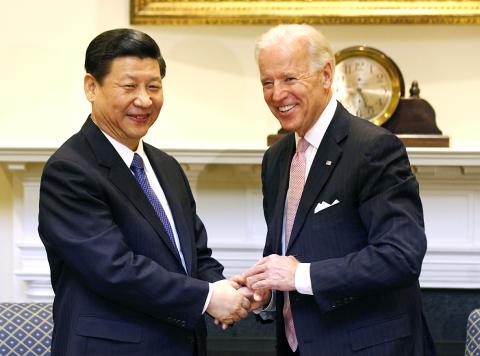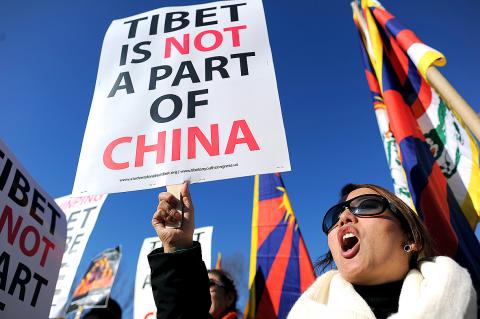Chinese Vice President Xi Jinping (習近平) landed in Washington late on Monday for a week of talks that could set the tone of US-China relations over the next decade.
“This visit comes at a time of growing strategic distrust,” China watchers Kenneth Lieberthal and J. Stapleton Roy said in the Washington Post.
Lieberthal, director of the Thornton China Center and Roy, director of the Kissinger Institute on China and the US, said Beijing sees itself as strong enough to expect Washington “will no longer treat its core concerns with what it views as a bullying, dismissive attitude.”

Photo: REUTERS
“China is pressing its territorial claims in potentially energy-rich maritime areas in the East and South China Seas,” they said.
“China, arguably the world’s second most powerful country, is rankled by US diplomacy that it sees as emboldening people in Taiwan, Tibet and the huge northwestern region of Xinjiang to defy Beijing,” they said.
Lieberthal and Roy said that while both Washington and Beijing considered good bilateral relations to be “vital,” there was a danger their growing strategic rivalry could evolve into “mutual antagonism.”

Photo: AFP
They said that both sides should try to reach a set of understandings that included steps embodying mutual restraint on development and deployments of particularly destabilizing weapons systems.
“To improve trust, such discussions need to probe each side’s goals and expectations on such sensitive issues as the Korean Peninsula and Taiwan,” they wrote.
In a front-page news story, the Post said Xi’s visit was crucial to his political ascension and to US hopes for easing “mounting tensions.”
Daniel Blumenthal, a resident fellow at the American Enterprise Institute, wrote in a Foreign Policy magazine blog that “sustained dialogue” was needed over such matters as the “risks of the perennial flashpoints” like Taiwan.
“Effectively deterring Chinese aggression in the South China Sea enhances US efforts to encourage peaceful resolution of disputes there,” Blumenthal wrote.
“Once Beijing comes to believe that intimidating others will not achieve its goals, engagement with Washington improves,” he wrote.
At his first event after his arrival in Washington, Xi said the US should adopt “concrete measures to promote mutual trust.”
“We hope the US side could view China in an objective and rational way, and adopt concrete measures to promote mutual trust, especially to properly and discreetly handle the issues concerning the core interests of China,” he said in remarks carried by Xinhua news agency.
He spoke during a meeting with several former top US officials, including former US secretaries of state Henry Kissinger and Madeleine Albright.
Xi was due to meet US President Barack Obama, Vice President Joe Biden and Secretary of State Hillary Rodham Clinton at the White House yesterday before driving to the Pentagon for talks with Secretary of Defense Leon Panetta. Later today, he will meet with congressional leaders before flying to Iowa.
Additional reporting by AFP

SECURITY: As China is ‘reshaping’ Hong Kong’s population, Taiwan must raise the eligibility threshold for applications from Hong Kongers, Chiu Chui-cheng said When Hong Kong and Macau citizens apply for residency in Taiwan, it would be under a new category that includes a “national security observation period,” Mainland Affairs Council (MAC) Minister Chiu Chui-cheng (邱垂正) said yesterday. President William Lai (賴清德) on March 13 announced 17 strategies to counter China’s aggression toward Taiwan, including incorporating national security considerations into the review process for residency applications from Hong Kong and Macau citizens. The situation in Hong Kong is constantly changing, Chiu said to media yesterday on the sidelines of the Taipei Technology Run hosted by the Taipei Neihu Technology Park Development Association. With

CARROT AND STICK: While unrelenting in its military threats, China attracted nearly 40,000 Taiwanese to over 400 business events last year Nearly 40,000 Taiwanese last year joined industry events in China, such as conferences and trade fairs, supported by the Chinese government, a study showed yesterday, as Beijing ramps up a charm offensive toward Taipei alongside military pressure. China has long taken a carrot-and-stick approach to Taiwan, threatening it with the prospect of military action while reaching out to those it believes are amenable to Beijing’s point of view. Taiwanese security officials are wary of what they see as Beijing’s influence campaigns to sway public opinion after Taipei and Beijing gradually resumed travel links halted by the COVID-19 pandemic, but the scale of

A US Marine Corps regiment equipped with Naval Strike Missiles (NSM) is set to participate in the upcoming Balikatan 25 exercise in the Luzon Strait, marking the system’s first-ever deployment in the Philippines. US and Philippine officials have separately confirmed that the Navy Marine Expeditionary Ship Interdiction System (NMESIS) — the mobile launch platform for the Naval Strike Missile — would take part in the joint exercise. The missiles are being deployed to “a strategic first island chain chokepoint” in the waters between Taiwan proper and the Philippines, US-based Naval News reported. “The Luzon Strait and Bashi Channel represent a critical access

Pope Francis is be laid to rest on Saturday after lying in state for three days in St Peter’s Basilica, where the faithful are expected to flock to pay their respects to history’s first Latin American pontiff. The cardinals met yesterday in the Vatican’s synod hall to chart the next steps before a conclave begins to choose Francis’ successor, as condolences poured in from around the world. According to current norms, the conclave must begin between May 5 and 10. The cardinals set the funeral for Saturday at 10am in St Peter’s Square, to be celebrated by the dean of the College